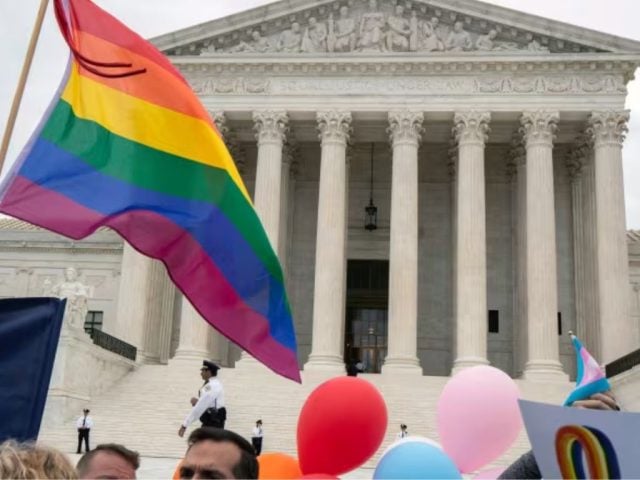A majority of the U.S. Supreme Court signaled Tuesday that it is open to backing a challenge to a Colorado law banning so‑called “conversion therapies” for minors—a move that, if it stands, could clear a legal path for practices widely discredited by mainstream medical science to be used on children and adolescents grappling with their sexual orientation or gender identity.
During a 90‑minute hearing that could redefine the boundary between free speech and state regulation of professional conduct, the Court’s six conservative justices suggested the Colorado law violates the First Amendment rights of therapists who want to offer services aimed at “converting” gay people to heterosexuality or transgender people to cisgender identities.
These controversial practices—often promoted within evangelical communities—seek to persuade teenagers that they are not gay or that the “gender dysphoria” they feel will fade with time.
While such “conversion” efforts gained traction in those communities in the 1980s and 1990s, by the end of that period several leading U.S. medical organizations had taken a clear stand against them, calling the practices false, ineffective, and potentially harmful.
The case, one of the most consequential of the current term, has nationwide implications. If the conservative‑leaning Court rules against Colorado, the decision could affect more than 20 other states with similar bans and may open new debates over state health regulations related to LGBTQ+ communities (lesbian, gay, bisexual, transgender, or queer people).
The lawsuit against Colorado’s law was filed by Kaley Chiles, an evangelical Christian therapist who argues that the rule barring her from discussing with minors how to “change” their sexual orientation or gender identity violates her First Amendment free speech rights.
Chiles, represented by the Christian legal group Alliance Defending Freedom, contends her “faith‑informed counseling” consists of “speech only,” and that clients seek out her services voluntarily.
She also rejects the label “conversion therapy,” describing her work in court filings as helping clients who “want to feel comfortable and at peace” with their bodies. According to her attorney, Jim Campbell, Colorado’s law blocks his client from “helping minors” for political reasons and censors “widely accepted views on moral and religious questions, and on which scientific debate remains open,” El País reported.
Free Speech or Harmful Therapy?
Chiles brought her case to the Supreme Court, where the nine justices on Tuesday heard arguments in the first oral session.
The core dilemma before the nation’s highest court is whether the “conversation” between a therapist and a minor in this context is protected speech—or, instead, medical conduct that the state has the right and duty to regulate to protect its most vulnerable citizens.
After the session, the Court’s six conservative justices appeared inclined to strike down Colorado’s ban on “conversion therapies.”
Chief Justice John Roberts aligned with the view that the challenged rule burdens First Amendment speech rights, citing prior precedent. “Just because [the petitioner] is working does not mean her words are not protected [by the First Amendment],” he said during the session—signaling a possible framework for a final decision expected at the end of the judicial year, in June 2026.
Medical Consensus: “Not a Legitimate Therapeutic Treatment”
Two leading U.S. medical and mental health organizations—the American Psychological Association and the American Psychiatric Association—have sided with Colorado in this case.
In a brief to the Court, they were unequivocal: “efforts to alter a patient’s sexual orientation, gender identity, or gender expression do not meet the criteria for a legitimate therapeutic treatment.” For years, these organizations have warned that such practices are false, ineffective, and “potentially harmful,” linking them to increased risks of depression, anxiety, and suicidal behavior among young people.
Ideological Clash at the U.S. Supreme Court
The hearing underscored the Court’s ideological divide. On the conservative side, Justice Samuel Alito was quick to embrace the petitioner’s arguments, asserting that Colorado was “blatantly discriminating against certain viewpoints.”
By contrast, the Court’s three liberal justices voiced skepticism. Justice Ketanji Brown Jackson pointed to a recent 6–3 ruling in which the Court upheld states’ rights to ban gender‑affirming care for trans minors. “It would be strange for this to come out differently,” she argued, suggesting that if the Court deferred to state regulatory power in that case, it should do so here as well.
Nationwide Consequences
The final ruling will not arrive until the end of the Court’s term. However, what the nine justices decide could ripple across the United States. Colorado is one of 23 states (plus Washington, D.C.) that have banned conversion therapy for minors. If the Court rules in favor of Chiles, it would not only invalidate Colorado’s law but could also deem similar bans nationwide unconstitutional, leaving thousands of young people without protections.
The case, Chiles v. Salazar (named for a state official), is not the only item affecting LGBTQ+ rights on the Court’s docket. The justices are also set to consider the legality of laws barring transgender individuals from participating in school and collegiate sports consistent with their gender identity.
As the Court deliberates, human rights and medical organizations warn that, far from constituting therapy, what’s being enabled is systemic harm—potentially sanctioned by the nation’s highest court. The door to interventions that science considers a dangerous fraud may be about to open.










